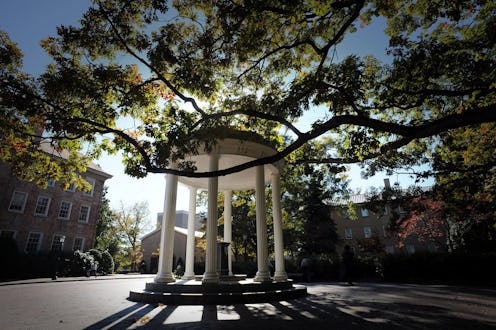News
This College Was Holding Fake Classes

Officials at the University of North Carolina at Chapel Hill revealed on Wednesday the findings from a massive investigation of academic fraud that implicates nine current university staff members and more than 3,000 former students. Four years after news of systemic "academic irregularities" broke, the independent investigation concluded UNC-Chapel Hill "held" fake classes and handed out inflated grades, primarily to student athletes who needed to pass certain academic requirements. This fraudulent system regularly took place for nearly 20 years before a university staff member blew the whistle on the corruption in 2010.
Led by former Department of Justice official Kenneth Wainstein, the investigation found that academic counselors championed a system of no-show classes, purported at first as "independent study" work, that gave out inflated grades for single research papers. These fraudulent courses were created by Deborah Crowder, a UNC-Chapel Hill grad who served as the student services manager for the Department of African and Afro-American Studies (AFAM) for 30 years.
The 136-page report describes these courses as "paper classes," requiring no in-person classes or faculty contact, and just one paper per term. While the courses initially began as "independent study," they were later labeled as lectures; however, no lectures actually took place.
Crowder allegedly managed all the students enrolled in the fake program. She even graded their papers even though she wasn't a professor, regularly giving students A's and B's. The report states:
Like traditional independent studies at Chapel Hill or any other campus, these classes entailed no class attendance and required only the submission of a single research paper. Unlike traditional independent studies, however, there was no faculty member involved in managing the course and overseeing the student’s research and writing process. In fact, the students never had a single interaction with a faculty member; their only interaction was with Crowder, the Student Services Manager who was not a member of the University faculty.
Crowder was overseen by Dr. Julius Nyang’oro, who took over as chairman of AFAM in 1992. Although Nyang'oro wasn't directly involved in the no-show classes until after Crowder retired in 2009, he embraced her program. "Crowder took advantage of the more permissive environment under Nyang’oro and started to implement a plan to offer classes that awarded high grades with little regard for the quality of a student’s work,"the report alleges.
Following Crowder's retirement, Nyang'oro began offering classes that "followed similar format and were equally lacking in academic rigor." The former chairman reportedly received $12,000 for one of his no-show classes — essentially being paid for not teaching. Nyang'oro was charged with a felony of academic fraud in December 2013, but the charge was later dropped because of his cooperation with the independent investigation.
Perhaps the most damning part of the investigation is that student athletes were primarily targeted — and benefited from — the fraudulent academic program. According to the report, student athletes accounted for 47.6 percent of enrollment. These students were referred to the fake classes by their advisers through the Academic Support Program for Student-Athletes. The advisers saw the no-show classes with inflated grades as a way for student athletes to maintain their scholarship eligibility without worrying about struggling too much with coursework.
The report also alleges that university staff members knew about the "academic irregularities," but never asked questions. Carol Folt, chancellor of UNC-Chapel Hill, said in a news conference on Wednesday:
Mr. Wainstein has found that the wrongdoing at Carolina lasted much longer and affected more students than previously known. The bad actions of a few and the inaction of others failed the University’s students, faculty and alumni, and undermined the institution as a whole. This conduct could and should have been stopped much earlier by individuals in positions of influence and oversight, and others could have sounded the alarm more forcefully.
The NCAA began investigating UNC-Chapel Hill's academic fraud in 2010. The collegiate sports organization slapped the school with sanctions, placing the football program on a three-year probation in 2012, banning the team from post-season play and reducing the number of scholarships. However, all the details of the case weren't known at the time, and this new investigation provides new insight on just how widespread and damaging the academic fraud truly was at the storied university.
Images: UNC-Chapel Hill/Facebook, Getty Images